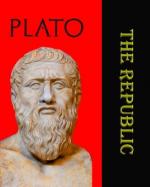|
This section contains 1,145 words (approx. 4 pages at 300 words per page) |

|
Poetry and Music for Plato
Summary: When he wrote "The Republic", Plato recognized the need for the rulers or `guardians' of his kallipolis to be good and righteous. He also realized that "imitations practiced from youth become part of nature".
When he wrote The Republic, Plato recognized the need for the rulers or `guardians' of his kallipolis to be good and righteous. He also realized that "imitations practiced from youth become part of nature" (Plato, Republic, 395d). It was with these two thoughts in mind that Plato decided to censor poetry and representations in the education of the guardians. He felt that, in portraying gods and heroes as slavish and iniquitous, poets, playwrights, musicians and storytellers encouraged people to imitate and adopt iniquitous and slavish natures or habits. Since it was necessary for the guardians of the just city to have natures opposite to the latter, Plato treated
poetry and representations as dangerous inclusions in the education of "the craftsmen of the city's freedom" (Plato, Republic, 395b-c).
One of the harder parts of the constitution of the kallipolis for modern readers to accept is the idea that people...
|
This section contains 1,145 words (approx. 4 pages at 300 words per page) |

|


